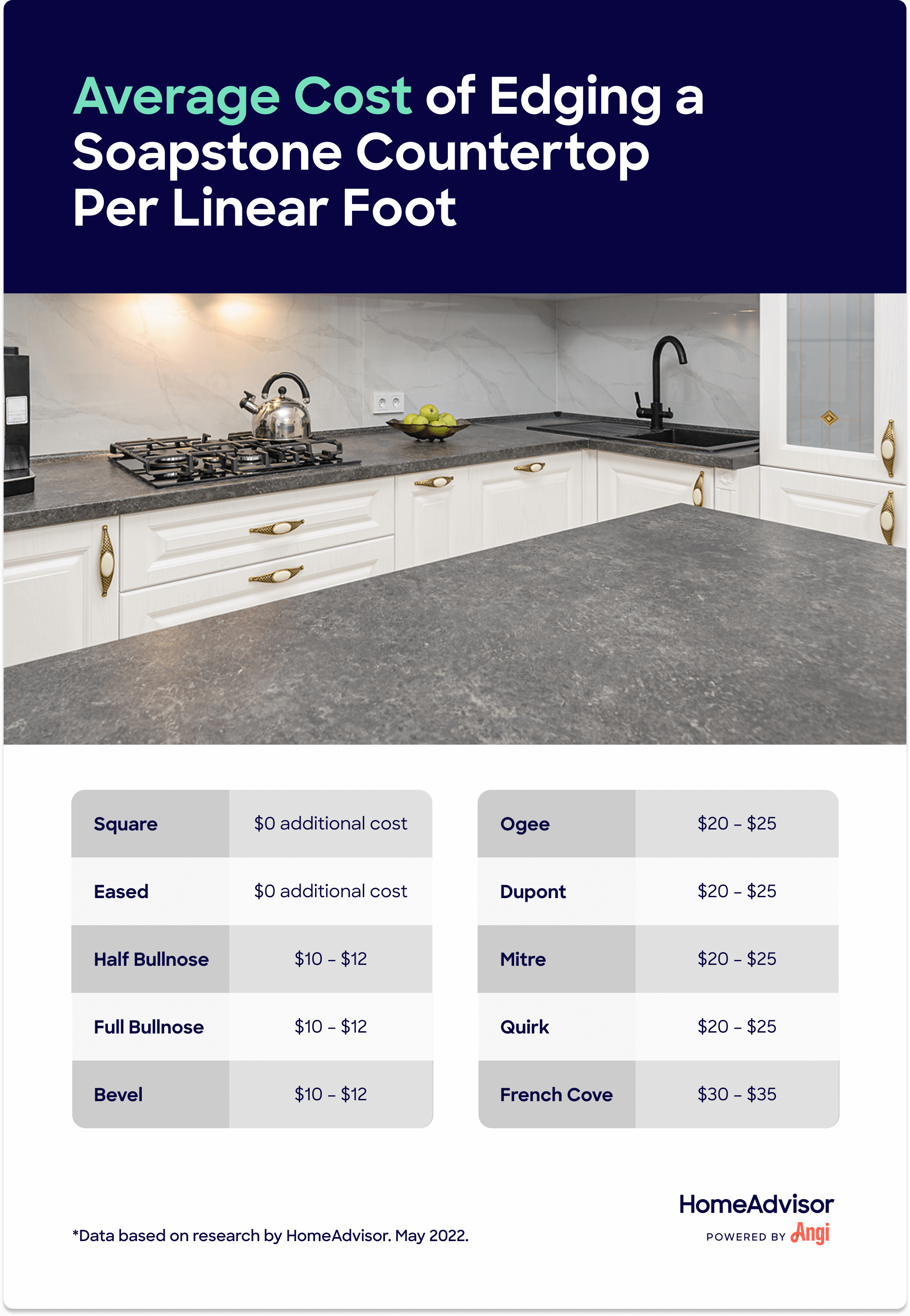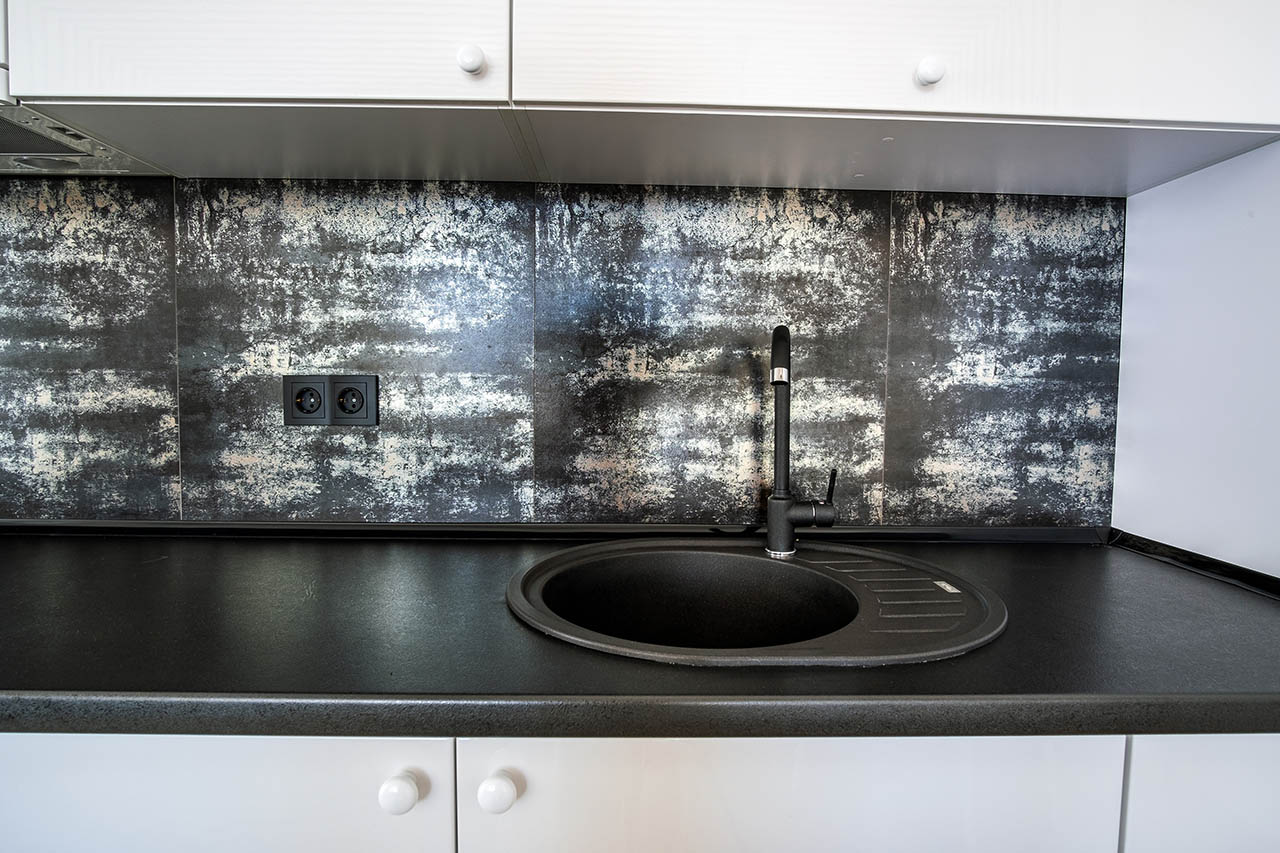How Much Do Soapstone Countertops Cost?
Typical Range:
$2,700 - $4,200
Typical Range:
$2,700 - $4,200
Cost data is based on research by HomeAdvisor.
Updated August 2, 2022
Reviewed by Andy Kilborn, Expert Home Building and Remodeling Contributor.If you plan to install soapstone countertops in your home, you can expect to pay $55 to $120 per square foot, with an average cost of $65 per square foot. The cost of soapstone countertops also depends on the price of installation and labor.
For 30 square feet, homeowners can expect to spend anywhere from $1,700 to $4,200 for soapstone countertops.
Soapstone is a natural stone that consists primarily of the mineral talc. It’s often compared to the soft texture of a bar of soap due to its high talc concentration.
Other minerals found in soapstone include magnesite, chlorite, and various amphiboles. It’s denser than slate, marble, and other harder stones, making it easy to clean and remain sanitary, which benefits kitchens and bathrooms.
You’ll find two types of soapstone: artistic and architectural.
Artistic soapstone: Has a high talc content—up to 80%. It’s primarily used in fine art carving, such as sculptures.
Architectural soapstone: Has a lower talc content of only 50%–70%. It’s best suited for countertop installation because it provides ease of carving.
When installing new countertops, there are many factors to consider. You should budget around $550 to $750 for professional installation, including delivery, prep work, and clean-up. You’ll also want to budget for special features like backsplashes and cut-outs.
Soapstone countertops cost anywhere from $55 to $120 per square foot. A typical 30-square-foot soapstone countertop costs about $2,100 to $3,600, not including installation.
"Ensure you look at a large piece of material to get a feel for how the countertop will look,” says Andy Kilborn, Angi Expert Review Board member and owner of Andy's Handyman Service in Des Moines, IA. “Evaluating small samples can lead to surprises about the appearance at the time of installation."
If you’re looking to remodel or refresh your kitchen, soapstone countertops are a great option. They’re durable, long-lasting, and heat-resistant. Here’s the total cost to put 30 square feet of soapstone countertops into your kitchen:
Materials: $2,100–$3,600
Installation: $550–$750
Total: $2,650–4,400
Soapstone makes an excellent choice for bathrooms because of its high hygiene level, and because it’s both non-porous and antibacterial. The average cost to install 6 to 12 square feet of soapstone into your bathroom is:
Materials: $700–$1,500
Installation: $400–$600
Total: $1,100–$2,100
There are many types of countertop materials to choose from, and they come in a range of prices—with soapstone falling in the middle range.
Soapstone is a great choice for custom countertop design due to its durability and mineral talc content. Manufacturers can cut soapstone to fit your space and dimensions.
Square: A straight 90-degree edge that provides a modern look
Eased: Slightly rounded corners with flat and modest sides
Full bullnose: Curves along the top and bottom for a smooth finish
Half bullnose: Follows the curve of a bullnose edge but has a flat bottom
Bevel: A sharp 45-degree angle with a border that seamlessly frames the countertop
Ogee: Has an S-shape curve with a larger depth than the countertop
Dupont: A shorter 90-degree angle that lays atop a rounded edge for an elegant finish
Mitre: A seamless edge between the top of the countertop and an adjoining stone Creates a specialty edge or a waterfall feature
Quirk: Has an L-shaped cut at the top with a straight bottom edge
French cove: A recessed top edge with a square bottom edge
Because soapstone shapes easily, you can add additional features around your sink. One of the most popular choices is an integrated drainboard, which drains water from washed dishes into the sink.
The least expensive drainboard option is a flat style. Higher-priced options include raised or recessed grooves, and the most costly option is a custom design.
There are three basic types of drainboards:
Traditional: A series of grooves cut deeper as they get closer to the sink. The water runs along these grooves and goes into the sink.
British: A smooth, recessed area with a small lip. The recessed area slopes toward the sink.
European: Similar to the British style in that it’s smooth, not grooved. However, there is no lip—it’s more like a ramp with a slight slope.
Only DIYers with prior countertop installation experience should take on this project. Because soapstone is relatively easy to cut, you’ll need a circular saw. You’ll also need help with lifting and moving the heavy slabs.
The DIY cost for 30 square feet of soapstone countertops will run around $2,850 for materials and supplies.
Otherwise, you should hire a local kitchen and bathroom countertop pro to ensure the job gets done right. Professional countertop installers will come equipped with the necessary tools and materials.
You can expect to pay anywhere from $2,100 to $3,600 for professional installation, including setup, cleaning, sanding, materials, and labor.
There are a ton of benefits to soapstone countertops, including the fact that it’s:
Environmentally friendly
Non-porous
Does not stain or crack easily
Heat resistant
Very durable
Easy to clean and maintain
Sanitary
Does not require sealing
There are also drawbacks to consider, including:
Only available in a few colors
The upfront cost is higher than other stones
Scratches and chips easily
Visible seams for large countertops
Soapstone darkens over time—developing a rich, deep patina, which could be either a pro or con. Many homeowners love the darkening effect, and they even try to speed up the process by treating their soapstone countertops with mineral oil. On the other hand, homeowners that are not aware of the darkening material may be surprised and consider that a negative.
Soapstone is highly durable and non-porous, making it ideal for kitchen and bathroom countertops. It’s acid-resistant (so you can spill juice and not worry about stains) and heat-resistant (which means you can place hot pots and pans directly on the surface without worrying about burn marks).
It’s also environmentally friendly because soapstone does not require any sealants when installed or for maintenance.
Soapstone is available in a range of light to dark grey hues and blue and green undertones. Like granite and quartz, soapstone is unique and each slab is different. Depending on the thickness of the slab, you’ll see varying degrees of streaks and veining.
With age, untreated soapstone develops a deep patina, which gives it a warm and inviting look.

